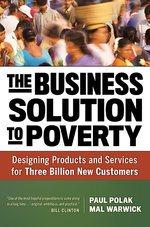
Mal Warwick, the legendary direct-response fundraising expert and entrepreneur, and Paul Polak, a leading social entrepreneur, have written a new book The Business Solution to Poverty, released on September 9. Although I have not yet read the book I found the title and description, below, to be very thought provoking, especially given that I’ve been involved in the citizen’s sector/civil society for most of my working life, possess an MBA and have work in the area of Corporate Social Responsibility (CSR).
“Approximately 2.7 billion people around the world live in poverty, representing a large market opportunity and exceeding the entire population of the world in 1950. Despite the fact that the global economy has grown 17-fold over the past six decades, about three of every eight people in the world exist on $2 per day or less. The question for business is how to simultaneously make a profit, serve these people ethically and effectively while enabling them to become part of the mainstream.
The United Nations has not solved the problem of global poverty. Foreign aid from wealthy governments has not solved the problem. Civil society and government have not solved the problem. Certainly, millions of people have been helped by traditional assistance efforts. In the Book it suggests that traditional methods and institutions, while not completely useless, have achieved only modest results, at best. In some cases, those results have not always been positive or sustainable.
The key is what Polak and Marwick call Zero-Based Design; starting from scratch to create innovative products and services tailored for the very poor, armed with a thorough understanding of what they really want and need and driven by what they call “the ruthless pursuit of affordability”. Through Polak and Marwick’s design principles and vision they hope to enable unapologetic capitalists to supply the very poor with clean drinking water, electricity, irrigation, housing, education, healthcare and other necessities at a fraction of the usual cost and at profit margins attractive to investors.
Resolving the issue of poverty has to be a multisectoral approach, i.e. corporate, civil society and government in order to be successful. All sectors have some motivation to “end poverty”, although these might be very different. For example, corporates need to constantly find new customers and expand their markets, civil society has a mission to help those who are disenfranchised and governments need foreign aid in order to function and must create a positive business environment which will bring in needed tax revenue, hopefully, depending on how these funds are spent result in alleviating poverty. This begs the question as tos how do we develop and implement multisectoral approaches to end poverty?
Social entrepreneurship has become a very hot topic combining the best of CSR and resolving social issues, potentially working with civil society organisations and government priorities. There are efforts underway in Nepal, through the Chaudhary Group (CG) and the Yunus Centre to launch a Social Business Fund (SBF) in order to promote an entrepreneurial approach to helping make in-roads into poverty alleviation. This is part of the Chaudhary Foundation’s CSR activities and must involve all sectors in order for the SBF to be successful. Governments must be part of social entrepreneurship and are launching programs, e.g. DfID and USAID including bi-lateral nutrition programs and the Global Development Alliance (GDA), in which the host government, corporate sector and civil society are engaged in eliminating some of the core roots of continuing poverty.
How do we as part of the larger global family, think more deeply about solutions to ending poverty, taking this to heart and making this our life work, so that this becomes fully integrated into organisational vision and mission statements no matter which sector we identify with. In order to really understand what we must do, we need to continue to talk about more than traditional philanthropy or “pet projects”, i.e. we need to use methods such as venture philanthropy. We need multisectoral approaches enabling others to more fully partake and have equal opportunities to the resources on this planet and to create partnerships, without ego, knowing that some of us may go out of business or need to change our methods.
I do my best to see the beauty of this planet, but I’m also greatly affected by my environment and what I see and read which greatly saddens me. At times, I identify with the character Mary Boatwright in the movie/book the Secret Life of Bees, someone who takes the sadness of the world so much to heart that she is unable to cope and although as Jesse Jackson said in the 1988 USA Democratic Convention, “Keep Hope Alive”, sometimes I’m really not sure.
What I am sure about is that, as one of my friends recently quoted from a conversation that she had with a patient, “if we can put a man on the moon then why can’t we solve poverty”. In fact we can solve poverty. But what it will take is the ruthless pursuit of wanting everyone no matter what their status, to have a decent, respectable life, where there is no hunger, where people have access to livelihoods, health services, education for their children, no matter their gender, where we respect our planet and take responsibility for the damage that we’ve already done and do our best to reverse this. We need to truly treat others the way in which they would like to be treated. A pipe dream, possibly, but it can happen if we are willing to be ruthless and find individuals who are willing to use their political capital and make a commitment. This is a challenge to all of us, no matter what our sector, but especially the corporate sector, so that the human race will be sustainable.










Add new comment